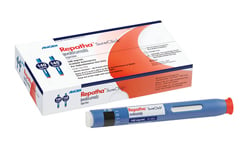
Amgen ($AMGN) got a thumbs-down from U.K. cost watchdog the National Institute for Health and Care Excellence (NICE) for its PCSK9 cholesterol-fighter Repatha (evolocumab), bad news for the drug as it contends with pricing pushback and competes head-to-head with Sanofi ($SNY) and Regeneron's ($REGN) Praluent for market share.
NICE said "no" to the drug in preliminary draft guidance, not only taking issue with its cost, but with evidence of its benefits. Repatha is "effective" in reducing bad cholesterol levels in people with high cholesterol, the agency said, but there's no proof that it can actually prevent angina, heart attacks and strokes, NICE said in a statement. Data from an outcomes study that would answer that question won't be available until the second half of 2016.
The cost-effectiveness body also questioned Amgen's analyses of cardiovascular risks and Repatha's potential effects on them. The company used Framingham risk equations instead of another NICE-recommended tool, calculations "which have been shown to overestimate risks" in U.K. patients, NICE said in a statement. And the cost watchdog found that Amgen set an "unrealistically high factor" to adjust for the risk of cardiovascular issues in individuals with a genetically inherited form of high cholesterol, one of Repatha's target populations.
For all these reasons, NICE decided that "the degree of uncertainty in the cost-effectiveness evidence was too high" to give Repatha its thumbs-up, the cost gatekeeper said in a statement. Repatha's annual cost per patient in the U.K. rings in at £4,448.60 ($6,763.49) for 140 mg every two weeks and £6,123.60 ($9,310.10) for 420 mg monthly, numbers that were difficult for NICE to stomach.
Meanwhile, Amgen is facing pricing pressure for its drug in the U.S. The company, which scored FDA approval for the drug back in August, set the price for Repatha at $14,100 per year, a bit lower than Sanofi and Regeneron's $14,600 price tag for rival med Praluent.
But U.S. pricing watchdogs are already taking aim at the med, with the not-for-profit Institute for Clinical and Economic Review saying in September that Repatha and Praluent should only cost about one-third of their list price or less. The two drugs offer enough benefits to justify a price of $3,615 to $4,811 year--a 67% discount off list prices, ICER said at the time. Anything higher would mean that "drug companies, doctors, insurers and other parties may need to work together to determine ways to limit the use of these drugs, find savings in other parts of the healthcare system, or adopt other measures to help make these drugs more affordable," ICER President Steven Pearson said in a statement.
Still, Amgen is making progress with Repatha on the payer front. Last month, Express Scripts ($ESRX) granted Repatha and Praluent spots on its preferred formulary after both companies offered discounts, surprising analysts and other industry watchers. The PBM said it had seen success at limiting the number of PCSK9 scripts by using prior authorization to screen eligible patients. Other key PBM decisions are pending, including rulings from CVS Health ($CVS) and OptumRx, the UnitedHealth ($UNH) pharmacy benefits manager. Meanwhile, Repatha inked a pay-for-performance deal with Harvard Pilgrim Health System that includes an up-front discount and additional rebates if the drug doesn't work as expected.
- read the NICE statement
- here's the PharmaTimes' take
Special Reports: Top 15 pharma companies by 2014 revenue - Sanofi - Amgen | 10 top drugs in biopharma's late-stage pipeline - Alirocumab | The 25 most influential people in biopharma in 2015 - Steve Miller - Express Scripts